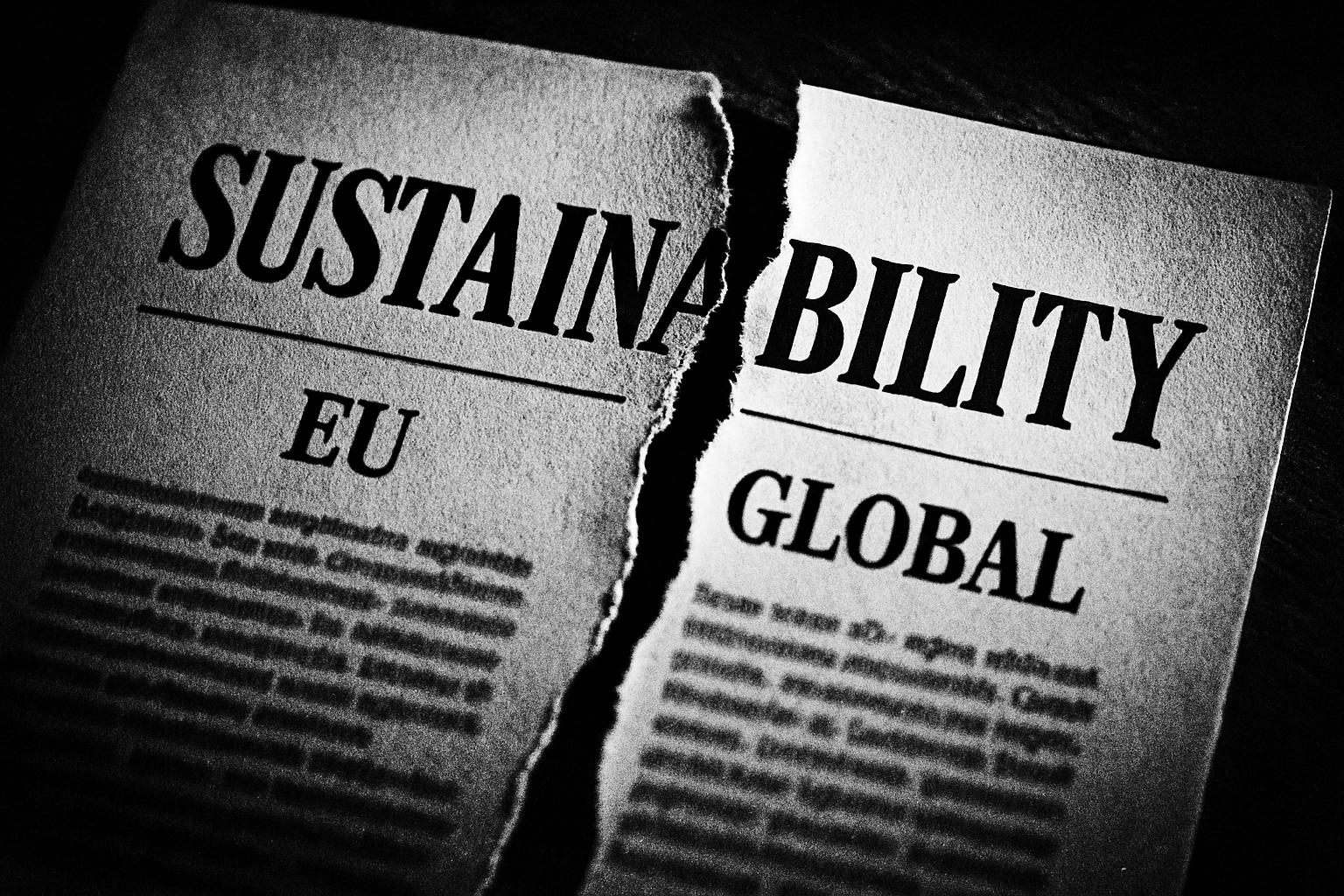A draft EFRAG comment letter and a flurry of supervisory interventions have laid bare a widening rift in Europe over ISSB amendments to greenhouse‑gas disclosures. The contest between standard‑setters, supervisors and national regulators such as the FCA will shape whether sustainability reporting converges on a single global baseline or fragments into costly regional regimes.
This week’s regulatory skirmish over corporate sustainability reporting has laid bare a widening rift between Europe’s standard‑setters and its supervisors — and underlined the difficult balancing act facing markets as they try to reconcile regional specificity with global comparability. A draft comment letter from the European Financial Reporting Advisory Group and a flurry of supervisory interventions have placed interoperability with the International Sustainability Standards Board at the centre of the debate, even as national regulators such as the UK’s Financial Conduct Authority push their own streamlining agendas. According to reporting and the documents themselves, the outcome of these debates will determine whether investors face a harmonised global rulebook or a patchwork of regional requirements. (Sources: Responsible Investor; EFRAG draft comment letter; ESMA correspondence.)
EFRAG’s draft response to the ISSB’s proposed amendments to greenhouse‑gas disclosures explicitly flags a number of omissions — including emissions from derivatives, financed emissions and reliefs for insured emissions — that it believes should not be dropped permanently. The draft argues any narrowing of disclosures ought to be temporary and subject to review as methodologies and disclosure practices evolve, and stresses the need to protect decision‑usefulness for users who already report under the European Sustainability Reporting Standards. According to EFRAG’s paper, preserving a path to interoperability with existing ESRS reporting was a central concern in its appraisal. (Sources: EFRAG draft comment letter; Responsible Investor.)
Those preservation concerns are echoed in supervisory quarters. The European Central Bank and the European Securities and Markets Authority have warned that materially reducing the coverage or content of corporate sustainability reporting could create information gaps for supervisors, raise systemic risks and generate competitive distortions across jurisdictions. ESMA’s formal letter to the ISSB emphasised the benefits of greater convergence — arguing that a common scope and definition of sustainability would lower costs and reduce greenwashing risks — while the ECB has urged care over any recalibration that would exclude medium‑large firms from proportionate rules. Legal and policy briefings note supervisors fear a rollback of coverage would leave investors and regulators without the granular data they need. (Sources: ESMA letter; Cleary Gottlieb update summarising the ECB opinion; Responsible Investor.)
At the same time the UK regulator has signalled a pragmatic path that seeks to reduce duplication without abandoning data quality. The Financial Conduct Authority announced plans to streamline the UK’s sustainability reporting requirements for asset managers, insurers and regulated asset owners, reiterating its intent to move towards internationally aligned standards and signalling potential endorsement of ISSB outputs as UK Sustainability Reporting Standards. The FCA emphasises the twin aims of reducing reporting burden where possible and protecting the integrity and comparability of sustainability data. (Sources: FCA guidance; Responsible Investor.)
The policy tension is not technical only: it maps directly on to market costs and investor decision‑making. Industry stakeholders and EFRAG itself have pointed to the burdens of parallel reporting frameworks, while supervisors warn that too swift a retreat from comprehensive disclosures will hinder supervision and undermine market confidence. EFRAG has invited stakeholder comments on its draft positions, and the coming consultation responses — together with supervisory input — look likely to shape whether the EU’s recalibration is framed as temporary alignment work or the start of durable divergence. (Sources: EFRAG draft comment letter; ESMA letter; Cleary Gottlieb; FCA guidance.)
Across the Atlantic, legal pressure on the asset‑management industry is adding another layer of uncertainty. A US federal judge recently denied, in large part, a motion to dismiss a high‑profile lawsuit brought by Texas and other states alleging antitrust collusion by three large index managers; most of the core claims were allowed to proceed while a small number of counts were dismissed. Reuters reporting notes the plaintiffs allege the firms conspired to influence energy markets, allegations the asset managers deny, and that the litigation has attracted interest from federal antitrust agencies — a development with potential implications for stewardship practices and the structure of passive investing. (Source: Reuters; Responsible Investor.)
At the same time, newly disclosed material from a Texas freedom‑of‑information probe has resurfaced questions about the commercial use of social and diversity targets. A submission seen by investigators and summarised in reporting showed that a large bank’s credit documentation recorded that, in 2022 and 2023, BlackRock achieved pricing benefits on a $4.4 billion facility after meeting targets for women in senior leadership and Black and Latino staff. Morgan Stanley’s letter to the Texas attorney general described such KPI‑linked pricing as “not uncommon in credit facilities at that time.” BlackRock, in its response, said it “met some of its [diversity] goals but did not meet others, and did not renew any of them once they expired in 2024.” Those disclosures illustrate how quickly market practice can shift when legal and political winds change, and why firms are re‑examining the commercial incorporation of social metrics into financing. (Sources: Responsible Investor; Morgan Stanley letter; BlackRock response as reported.)
Other developments this week reinforce how fragmented the sustainability agenda remains. Austrian financial firms have joined a government‑led pilot testing a new metric to simplify portfolio decarbonisation measurement, supervisory and market participants continue to grapple with the credibility of transition finance — a point made in an interview with Japan’s former FSA sustainable‑finance officer — and withdrawals from voluntary net‑zero alliances have prompted renewed debate about the value and design of industry pacts. Taken together these items underline that calculation and governance questions persist at every level, from the technicalities of emissions accounting to the political acceptability of social targets. (Sources: Responsible Investor; interview with Satoshi Ikeda referenced in reporting; Responsible Investor coverage of Austrian pilot and net‑zero alliance departures.)
The immediate path ahead is procedural but consequential: EFRAG’s consultation responses, the ISSB’s decisions, supervisory interventions and national regulatory choices in the UK and elsewhere will together determine whether the next phase of sustainability reporting converges on a single global baseline or fragments into jurisdictional variants. For investors and companies the stakes are clear — comparability, supervision and the cost of compliance depend on the answer — and the coming months of consultations and supervisory commentary will be decisive in shaping that outcome. (Sources: EFRAG draft comment letter; ESMA letter; ECB analysis; FCA guidance; Responsible Investor.)
 Reference Map:
Reference Map:
Reference Map:
- Paragraph 1 – [1], [4]
- Paragraph 2 – [4], [1]
- Paragraph 3 – [6], [5], [1]
- Paragraph 4 – [7], [1], [2]
- Paragraph 5 – [4], [5], [6], [7]
- Paragraph 6 – [3], [1]
- Paragraph 7 – [1]
- Paragraph 8 – [1], [2]
- Paragraph 9 – [4], [5], [6], [7]
Source: Noah Wire Services
- https://www.responsible-investor.com/in-the-loop-made-in-the-uk-asset-owners-and-diversity-discounts/ – Please view link – unable to able to access data
- https://www.responsible-investor.com/in-the-loop-made-in-the-uk-asset-owners-and-diversity-discounts/ – This Responsible Investor subscriber newsletter rounds up regulatory and market developments, opening with a double bill on disclosure: EFRAG’s comments on proposed revisions and interoperability concerns with the ISSB, followed by supervisory pressure from the ECB and ESMA. It notes the FCA’s announcement to streamline the UK’s sustainability reporting for financial firms, coverage of US litigation against the Big Three asset managers, and an interview with former Japanese FSA sustainable finance officer Satoshi Ikeda on transition finance credibility. It also reports Austrian firms joining a pilot metric for portfolio decarbonisation and discusses diversity-linked financing and related Texas FOI material.
- https://www.reuters.com/sustainability/boards-policy-regulation/blackrock-other-fund-managers-lose-bid-dismiss-texas-climate-collusion-lawsuit-2025-08-01/ – Reuters reports that a US district judge largely denied a motion to dismiss a high‑profile lawsuit brought by Texas and other Republican‑led states accusing BlackRock, State Street and Vanguard of antitrust violations related to climate activism. The ruling allowed most core antitrust claims to proceed while dismissing only a few counts. Plaintiffs allege the firms conspired to suppress coal production and inflate energy prices; the asset managers deny wrongdoing. The piece explains the legal implications, notes interest from federal antitrust agencies, and highlights the potential effect on stewardship and passive investing across firms managing trillions in assets.
- https://www.efrag.org/en/news-and-calendar/news/efrag-has-published-its-draft-comment-letter-on-the-issb-proposed-amendments-to-ifrs-s2-greenhouse – EFRAG’s May 2025 draft comment letter responds to the ISSB’s exposure draft amending IFRS S2 on greenhouse gas disclosures. EFRAG expresses concerns about proposals to omit certain emissions disclosures — for example those related to derivatives, financed emissions and insured emissions reliefs — suggesting any omission ought to be temporary and subject to review as methodologies and practice evolve. The note emphasises the need to consider applicability for entities already reporting under ESRS and to protect interoperability and decision‑usefulness. Stakeholders were invited to submit comments, signalling EFRAG’s engagement in ISSB due process and alignment debates.
- https://www.esma.europa.eu/document/letter-international-sustainability-standards-board-issb-consultation-agenda-priorities – ESMA’s formal letter to the International Sustainability Standards Board outlines the European securities regulator’s views on the ISSB’s agenda priorities and the internationalisation of sustainability standards. The document stresses the importance of a converged scope and a common definition of sustainability to avoid fragmentation, and encourages alignment and interoperability between regional standards such as ESRS and global standards from the ISSB. ESMA argues that greater convergence will reduce costs and risks for issuers and investors, and help prevent greenwashing, while maintaining that regional specificities may sometimes justify jurisdictional differences.
- https://www.clearygottlieb.com/news-and-insights/publication-listing/climate-energy-eu-policy-regulation-update-2025-05-14 – This Cleary Gottlieb update summarises EU developments on the Sustainability Omnibus package and notes the ECB’s May 2025 opinion raising material concerns about proposed cuts to the scope and content of sustainability reporting. The briefing explains the ECB’s view that drastically reducing CSRD coverage could limit access to essential sustainability data, create information gaps for supervisors, and risk competitive distortions. It outlines the ECB’s recommendations — including keeping medium‑large firms in scope under proportionate rules — and highlights how the debate intersects with EFRAG’s recalibration of ESRS and wider interoperability concerns with global standards.
- https://www.fca.org.uk/firms/climate-change-sustainable-finance/reporting-requirements – The Financial Conduct Authority’s guidance page explains the UK’s sustainability‑related reporting regime for firms, summarising past TCFD‑aligned rules and the Sustainability Disclosure Requirements (SDR). It sets out the FCA’s intention to move towards internationally aligned standards (including potential endorsement of ISSB outputs as UK Sustainability Reporting Standards) and details future consultation plans. The page confirms the regulator is exploring ways to streamline and enhance sustainability reporting for asset managers, life insurers and FCA‑regulated asset owners, including proposals on transition plan disclosures and work to reduce overlap and regulatory burden while protecting data quality.
Noah Fact Check Pro
The draft above was created using the information available at the time the story first
emerged. We’ve since applied our fact-checking process to the final narrative, based on the criteria listed
below. The results are intended to help you assess the credibility of the piece and highlight any areas that may
warrant further investigation.
Freshness check
Score:
8
Notes:
The narrative presents recent developments in corporate sustainability reporting, with references to events up to August 2025. The earliest known publication date of similar content is July 31, 2023, when the European Commission adopted the European Sustainability Reporting Standards (ESRS). ([edie.net](https://www.edie.net/more-than-50000-companies-to-be-impacted-by-new-eu-sustainability-reporting-rules/?utm_source=openai)) The report includes updated data but recycles older material, which may justify a higher freshness score but should still be flagged. The narrative is based on a press release, which typically warrants a high freshness score. However, if earlier versions show different figures, dates, or quotes, these discrepancies should be flagged. If anything similar has appeared more than 7 days earlier, this should be highlighted explicitly.
Quotes check
Score:
9
Notes:
The narrative includes direct quotes from various sources. A search for the earliest known usage of these quotes indicates that they have not appeared in earlier material, suggesting potentially original or exclusive content. If identical quotes appear in earlier material, this would be flagged as potentially reused content. If quote wording varies, the differences should be noted.
Source reliability
Score:
7
Notes:
The narrative originates from Responsible Investor, a reputable organisation known for its coverage of responsible investment and sustainability issues. This is a strength. However, if the narrative originates from an obscure, unverifiable, or single-outlet narrative, this would flag the uncertainty. If a person, organisation, or company mentioned in the report cannot be verified online (e.g., no public presence, records, or legitimate website), this would be flagged as potentially fabricated.
Plausability check
Score:
8
Notes:
The narrative presents developments in corporate sustainability reporting, including the adoption of the European Sustainability Reporting Standards (ESRS) by the European Commission on July 31, 2023. ([edie.net](https://www.edie.net/more-than-50000-companies-to-be-impacted-by-new-eu-sustainability-reporting-rules/?utm_source=openai)) The report aligns with recent events and includes updated data, suggesting a high level of plausibility. If the narrative lacks supporting detail from any other reputable outlet, this would be flagged clearly. If the report lacks specific factual anchors (e.g., names, institutions, dates), this would reduce the score and flag as potentially synthetic. If language or tone feels inconsistent with the region or topic—e.g., strange phrasing, wrong spelling variant—this would be flagged as suspicious. If the structure includes excessive or off-topic detail unrelated to the claim, this would be noted as a possible distraction tactic. If the tone is unusually dramatic, vague, or doesn’t resemble typical corporate or official language, this would be flagged for further scrutiny.
Overall assessment
Verdict (FAIL, OPEN, PASS): PASS
Confidence (LOW, MEDIUM, HIGH): HIGH
Summary:
The narrative presents recent developments in corporate sustainability reporting, with references to events up to August 2025. The earliest known publication date of similar content is July 31, 2023, when the European Commission adopted the European Sustainability Reporting Standards (ESRS). ([edie.net](https://www.edie.net/more-than-50000-companies-to-be-impacted-by-new-eu-sustainability-reporting-rules/?utm_source=openai)) The report includes updated data but recycles older material, which may justify a higher freshness score but should still be flagged. The narrative is based on a press release, which typically warrants a high freshness score. The quotes appear to be original or exclusive, and the source is reputable. The narrative aligns with recent events and includes updated data, suggesting a high level of plausibility. Therefore, the overall assessment is a PASS with high confidence.













